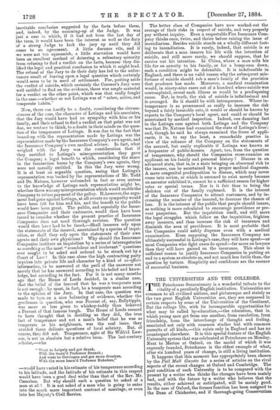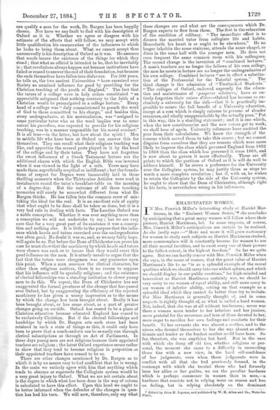THE UNIVERSITIES AND THE COLLEGES.
It happens that this moment has appropriately been chosen by the Pall Mall Gazette for a series of articles on the rival aspects of the recent changes at Oxford and Cambridge. The past condition of each University is to be compared with the present by a writer who thinks the changes have been mainly bad, and with the future by a writer who believes that the results, either achieved or anticipated, will be mainly good. In the case of Oxford, the former function has been assigned to the Dean of Chichester, and if thorough-going Conservatism
can qualify a man for the work, Dr. Burgon has been happily chosen. Nor have we any fault to find with his description of Oxford as it is. Whether we agree or disagree with his estimate of the effects that will follow, we may accept with little qualification his enumeration of the influences to which he looks to bring them about. What we cannot accept thus unreservedly is his description of Oxford as it was. He assumes that words insure the existence of the things for which they stand ; that what an official is intended to be, that he inevitably is ; that revolutions always happen not because institutions have failed or ceased to answer the end of their foundation, but because the ends themselves have fallen into disfavour. For 500 years, he tells us, the two ancient Universities " have exercised over Society an unmixed influence for good by providing for the Christian teaching of the youth of England." The fact that the tutors of a college were in holy orders constituted "an appreciable safeguard that nothing contrary to the faith of a Christian would be promulgated in a college lecture." Every head of a college was " duly commissioned to preach the word of God to thcse committed to his charge," and besides this, every undergraduate, at his matriculation, was " assigned to some particular tutor who as the word implies was to some extent his guardian, was expected to provide for his religious teaching, was in a manner responsible for his moral conduct." It is all true—in the letter, but how about the spirit ? Men in middle life who have been at Oxford can answer this for themselves. They can recall what their religious teaching was like, and apportion the several parts played in it by the head of the college and by their tutor. They have not forgotten the sweet influences of a Greek Testament lecture nor the additional charm with which the English Bible was invested when it was viewed in the light of a crib. Years may have made them superficially sceptical or indifferent ; but the founda- tions of respect for Dogma were immovably laid in those thrilling moments when the Thirty-nine Articles were read in instalments round the tutor's breakfast-table on the morning of a degree-day. But the outcome of all these touching memories will surely be somewhat different from what Dr. Burgon thinks. He has fallen into the common error of mis- taking the ideal for the real. It is an excellent rule of equity that what ought to be done shall be taken as done, but it is a very bad rule in dealing with facts. The Laudian Oxford was a noble conception. Whether it was ever anything more than a conception we will not undertake to say ; but we are very sure that for a very great part of its existence it was a concep- tion and nothing else. It is little to the purpose that the influ- ence which heads and tutors exercised over the undergraduates was often good. No doubt it was so, and, as we may fairly hope, will again be so. But before the Dean of Chichester can prove his case he must show that the machinery by which heads and tutors were chosen was such as to insure that they would exert this good influence on the men. It is utterly unsafe to argue that the fact that the tutors were clergymen was any guarantee upon this point. When a man assumes the clerical character, for other than religious motives, there is no reason to suppose that his influence will be specially religious ; and the existence of clerical fellowships was a standing invitation to clever young men to do this. We repeat, the Dean of Chichester has not exaggerated the formal greatness of the change that has passed over Oxford, but by exaggerating the efficiency of the rejected machinery he has given a wrong impression as to the means by which the change has been brought about. Really it has been brought about, or has come about, as a part of greater changes going on outside. Oxford has ceased to be a place of Christian education because educated England has ceased to be exclusively Christian. But if the clerical fellowships and headships by which Dr. Burgon sets such store had been retained in such a state of things as this, it could only have been to prove that a coach-and-six can be as easily run through clerical subscriptions as through an Act of Parliament. In these days young men are not religious because their appointed teachers are religious ; the latest Oxford experience seems rather to show that they tend to become religious in proportion as their appointed teachers have ceased to be so.
There are other changes mentioned by Dr. Burgon as to which it is by no means easy to feel confident that he is wrong.
In the main we entirely agree with him that anything which tends to obscure or supersede the Collegiate system would be a very great injury to Oxford. What we are not certain about is the degree in which what has been done in the way of reform is calculated to have this effect. Upon this head we ought to be better informed when the defender of the changes in ques- tion has had his turn. We will now, therefore, only say what
these changes are and what are the consequences which Dr. Burgon expects to flow from them. The first is the relaxation of the condition of celibacy. " The immediate effect is to divorce the married tutor from collegiate life and habits. Henceforth his heart is or ought to be elsewhere." He no longer inhabits the same staircase, attends the same chapel, or dines in the same hall with the younger men. He does not even frequent the same common room with his colleagues. The second change is the invention of " combined lectures." A man's teachers are no longer the fellows of his own college, the men he meets in lecture are no longer the undergraduates of his own college. Combined lectures "are in effect a substitu- tion of the Professorial for the Tutorial system." The third change is the admission of " Unattached Students." " The colleges of Oxford, endowed expressly for the educa- tion and maintenance of pauperes scholares,' have so en- tirely forgotten their raison d'être—Oxford has become so ex- clusively a university for the rich—that it is practically im- possible to secure the full benefit of a University education, except at a cost which is simply ruinous to persons of slender resources, and wholly unapproachable by the actually poor." Put in this way, this is a startling statement ; and it is one which, when the new constituencies and the new voters get to work, we shall hear of again. University reformers have omitted the poor from their calculations. We know the strength of the reasons which moved them to take this course' but we cannot disguise from ourselves that they are reasons which were more likely to impress the class which governed England from 1832 to 1868 than the class which has governed it since 1868, and is now about to govern it more effectually. These are all points to which the partizan of Oxford as it is will do well to address himself. If he avows a preference for the University over the Collegiate system, he may justify them as steps to- wards a more complete revolution ; but if, with us, he wishes to retain the Collegiate by the side of the University system, he ought to show that the Dean of Chichester, although right in his facts, is nevertheless wrong in his inferences.



































 Previous page
Previous page